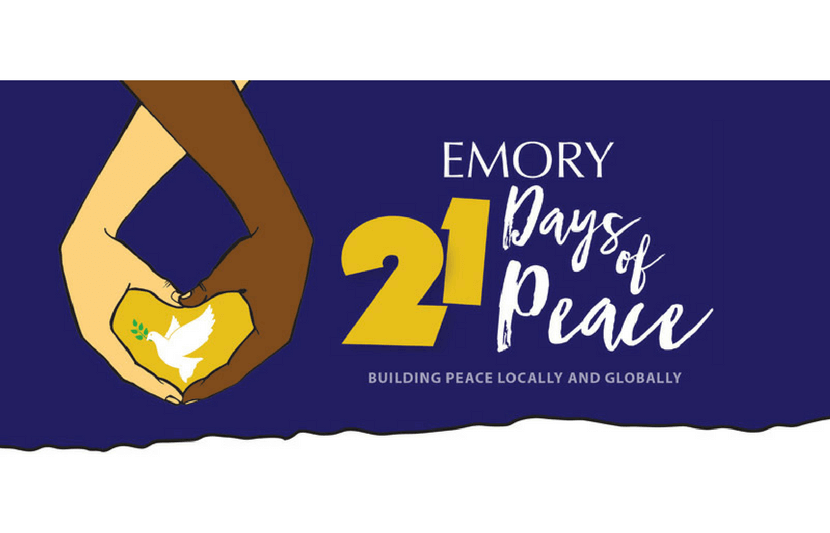Each year, September 21 is observed as the International Day of Peace. Emory University too will be observing this special day as it wraps up “Emory 21 Days of Peace,” a program launched last year with the lofty goal of “building peace locally and globally.”
The United Nations General Assembly established September 21 as the International Day of Peace in 1981. Twenty years later, the General Assembly designated the day as a day of non-violence and ceasefire. The UN urges nations and people to honor “the cessation of hostilities” on this designated day of peace and to commemorate it “through education and public awareness of issues related to peace.”
Emory University has not just embraced the concept, but gone one step further in an effort to advance the purpose behind the International Day of Peace by extending one day to a program of peace that lasts 21 days, starting last year.
Last year’s program was so successful that the university is repeating it this year. Emory University’s Institute for Developing Nations (IDN) has collaborated with Emory Campus Life, The Carter Center Human Rights Program, and The U.S. Institute of Peace to promote its second annual Emory 21 Days of Peace campaign.
To achieve its goal of building peace locally and globally, the university created a social media campaign titled “Emory Peacemakers” and implemented a three-week calendar of events for students, professors, and faculty in the Emory community.
Members of the Emory community involved in this campaign are striving to use peace as a counterbalance for the violence that is all too visible these days.
“We hope to affirm peace as an alternative to the seemingly ubiquitous violence around the world,” said Obse Ababiya, senior program coordinator for IDN.
The goal of this initiative is to educate, inspire, and empower students working for peace both in their local and global communities.
The Emory 21 Days of Peace Committee includes 25 people from various institutes, departments, and schools because diversity is so essential to promoting peace. It is only through learning and tolerance of another person’s viewpoint that we can bridge the differences that exist.
“We provide resources to students working on peace to connect them with scholars and practitioners working in this field,” said Ababiya.
The event programming includes a broad range of Emory’s academic departments. The Office of Spiritual and Religious Life has invited members of the Emory community to participate in daily prayers and meditations promoting peace. Members of the Departments of Political Science and Anthropology, Emory School of Law, Department of Psychology and Interdisciplinary Studies, and the Rollins School of Public Health created a workshop to show students how to translate their research into policy to build relationships and develop world solutions.
A conversation with President Jimmy Carter on September 13 allowed first-year students to submit questions and hear the ex-President address the Emory community. The keynote speaker scheduled to close the campaign on September 21 is Marguerite Barankitse, a renowned Burundian humanitarian. Barankitse spent her time caring for orphaned children during the Burundi civil war and created Maison Shalom, a complex of schools and hospitals throughout Burundi focused on children’s welfare, in response.
Members of this campaign have high hopes that it will spark conversation and initiatives in other universities and organizations, but they recognize that this is just the beginning.
“The goal is to empower students on how their actions have an impact and that each person can make a difference in contributing to peace,” said Ababiya. “Our individual contributions then make an impact to our collective contributions to peace. We are pursuing peace as a tangible goal and not just a theory for discussion.”
Campaign members have been evaluating the effectivity of this peace initiative and are already developing ideas for next year.
“We have been asking our community members about how we can pursue peace and we have received some great responses,” said Ababiya. “We will also be following up on those responses to take our next steps.”



